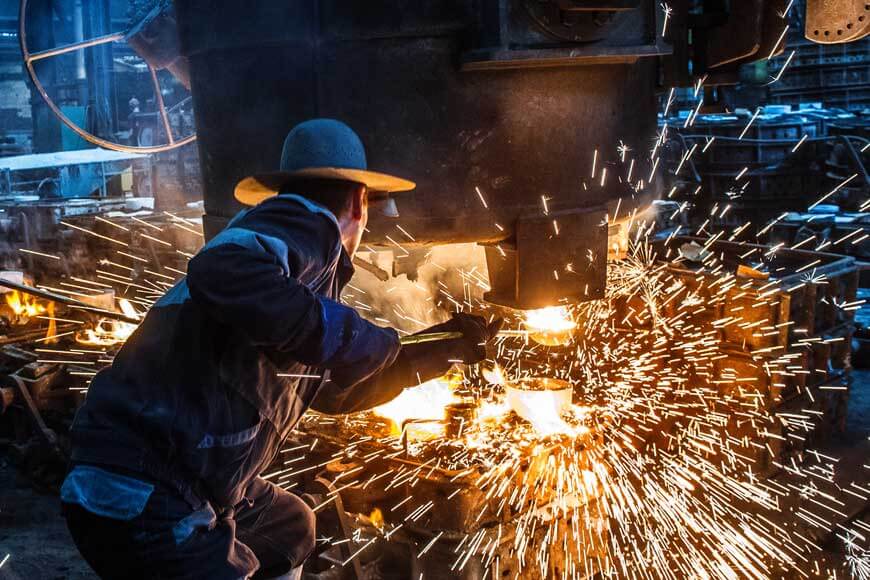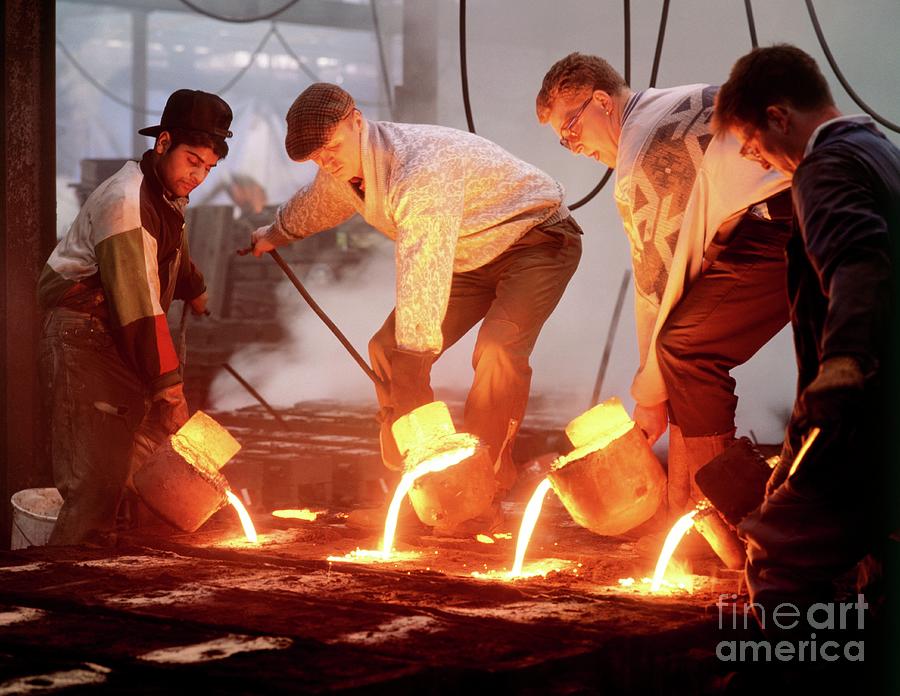Exactly How a Metal Foundry Adds To Sustainable Metal Production Practices
Metal foundries play an essential function in advertising sustainability within the metal manufacturing market. By including recycled materials, they decrease dependence on virgin sources and lessen environmental effects. Energy-efficient melting processes further lessen power intake and exhausts. Nevertheless, the journey towards sustainable methods entails greater than just recycling and power management. It incorporates a more comprehensive commitment to ethical sourcing and innovative innovations. The implications of these methods are considerable and warrant better assessment.
The Function of Recycling in Metal Foundries
While metal manufacturing has actually generally depended on virgin products, the boosting focus on sustainability has caused a considerable shift in practices, particularly in metal foundries. Recycling has actually emerged as a necessary element of this improvement, enabling foundries to repurpose scrap metal and decrease reliance on mined resources. By integrating recycled products right into their procedures, foundries not only decrease ecological effect however likewise lower production costs.
Using recycled steels, such as aluminum, copper, and steel, lessens power intake and decreases greenhouse gas emissions connected with typical mining and refining approaches. Foundries can attain top notch outputs by employing innovative sorting and processing innovations to guarantee the purity of recycled products. This emphasis on recycling fosters a round economic situation, where waste is decreased, and sources are used efficiently. Consequently, metal foundries play a pivotal duty in promoting lasting methods within the metal manufacturing industry.
Energy-Efficient Melting Methods
Energy-efficient melting strategies are crucial for enhancing sustainability in metal production. These techniques considerably minimize power intake throughout the melting process, which is one of one of the most energy-intensive phases in metal manufacturing. Technologies such as induction melting, resistance home heating, and microwave melting deal improved effectiveness contrasted to traditional techniques. Induction melting, for example, uses electro-magnetic areas to create heat directly within the metal, decreasing energy loss and offering exact temperature level control.
Additionally, carrying out warmth recuperation systems can better enhance efficiency by catching and reusing waste warmth created throughout melting. Using innovative insulation products and optimizing furnace designs also add to energy savings. By adopting these innovative melting strategies, metal foundries can decrease their carbon impact, lower functional expenses, and add to an extra lasting manufacturing landscape. The combination of energy-efficient techniques not only straightens with ecological goals however additionally satisfies the growing need for responsible production techniques in the metal market.
Sustainable Sourcing of Raw Products
Sustainable sourcing of raw materials is essential for minimizing the environmental influence of metal manufacturing. This includes the enhanced utilization of recycled steels, the adoption of ethical mining techniques, and efforts focused on regional sourcing. By prioritizing these techniques, the sector can promote accountable source administration and support neighborhood economies.

Recycled Metal Utilization
Just how can markets effectively lower their environmental influence while meeting the expanding need for metal? One considerable method is the application of recycled metal. By integrating scrap metal right into their production procedures, foundries can decrease the extraction of virgin products, therefore saving natural deposits and minimizing power consumption. Recycled steels call for less power to procedure compared to their raw counterparts, causing reduced greenhouse gas discharges. Additionally, the usage of recycled metal aids divert waste from garbage dumps, advertising a round economy. Industries that focus on recycled metal not just add to sustainability but likewise advantage from price savings connected with lowered product purchase. Consequently, recycled metal use stands as an important method for environmentally accountable metal manufacturing.
Ethical Mining Practices
While the demand for metals remains to increase, sectors are increasingly recognizing the significance of ethical mining practices in guaranteeing accountable sourcing of resources. Ethical mining includes a dedication to environmental stewardship, social obligation, and adherence to reasonable labor practices. Business are now focusing on partnerships with mines that show openness in their operations, minimizing eco-friendly impact and respecting neighborhood areas. This approach not only cultivates a sustainable supply chain but additionally improves the track record of services included. By executing rigorous criteria and qualifications, industries can battle unlawful mining activities and advertise the well-being of workers. Ultimately, moral mining methods contribute significantly to a much more sustainable metal manufacturing environment, aligning economic growth with social and ecological stability.
Local Sourcing Initiatives

Developments in Metal Casting Processes
Advancements in metal casting procedures are transforming the industry by incorporating advanced recycling techniques that decrease waste. Energy-efficient melting approaches are also being created to reduce power consumption throughout manufacturing. Furthermore, making use of cutting-edge mold and mildew products contributes to improved performance and sustainability in casting operations.
Advanced Recycling Techniques
Advanced recycling methods are changing metal casting procedures, significantly enhancing sustainability in the market. These advancements concentrate on recycling and recovering scrap metal, considerably decreasing waste and the demand for virgin materials. Strategies such as hydrometallurgy and pyrometallurgy allow foundries to draw out valuable metals from made use of components, making sure efficient resource utilization. Additionally, progressed sorting and filtration technologies improve the high quality of recycled steels, making them appropriate for high-performance applications. This not just reduces the ecological footprint of metal manufacturing yet likewise cultivates a round economic climate by advertising the reuse of materials. As these reusing approaches continue to advance, they guarantee to further enhance procedures within foundries and add to an extra sustainable metal production landscape.
Energy-Efficient Melting Methods
While conventional melting methods have long been the foundation of metal casting, recent innovations have presented energy-efficient methods that substantially decrease power intake and emissions. Technologies such as induction melting and electrical arc heaters have acquired prestige, enabling specific control over temperature and decreasing the demand for nonrenewable fuel sources. These methods not just boost power efficiency however additionally promote faster melting times, which equates to decrease functional costs. Additionally, technologies in warm recuperation systems make it possible for foundries to record and reuse excess heat produced throughout the melting procedure. This all natural strategy to energy monitoring not just sustains lasting techniques yet additionally positions metal foundries as leaders in the shift towards greener manufacturing processes, additionally straightening with international sustainability objectives.
Cutting-edge Mold Products
As the need for even more reliable and sustainable metal casting processes expands, the exploration of ingenious mold and mildew materials has actually become a centerpiece in the sector. Traditional mold and mildew products often add to environmental obstacles, triggering the search for alternatives that minimize waste and power usage. Recent improvements include the development of recyclable compounds and eco-friendly binders, which not just improve mold efficiency yet likewise reduce ecological impact. In addition, the usage of 3D printing modern technology in mold creation allows for detailed designs that lower product usage and make it possible for quick prototyping. These cutting-edge materials not just enhance casting accuracy yet likewise align with why not check here sustainability objectives, showcasing the industry's dedication to reducing its carbon impact while preserving high-quality production criteria.
Lowering Waste With Advanced Innovation
Ingenious modern technologies are transforming the metal production market by greatly decreasing waste and boosting performance. Advanced information analytics and artificial intelligence formulas website here make it possible for foundries to maximize production processes, lessening and identifying inadequacies scrap product. Smart sensing units keep track of devices performance in real-time, enabling anticipating upkeep that minimizes downtime and waste generation. In addition, additive production techniques, such as 3D printing, enable the creation of complex components with minimal material use, considerably reducing waste compared to conventional methods.
Furthermore, closed-loop systems are becoming much more common, wherein scrap metal and byproducts are recycled back into the production cycle, guaranteeing that materials are utilized to their fullest potential - Metal Casting. This assimilation of modern technology not just promotes resource preservation however also boosts the general sustainability of metal production techniques. By accepting these innovations, foundries can contribute to a more sustainable future while maintaining competitiveness in the marketplace
The Impact of Foundries on Carbon Impact Decrease
Foundries play a necessary role in reducing the carbon impact of the metal manufacturing sector by implementing numerous sustainable techniques. By using energy-efficient modern technologies, such as electric arc heaters, these centers considerably lower greenhouse gas emissions compared to conventional approaches. Furthermore, foundries significantly adopt renewable resource resources, which also reduces their dependence on fossil fuels.
Reusing scrap metal is another essential method that foundries use, conserving resources and minimizing the need for virgin materials. This not just minimizes waste however additionally lowers the energy-intensive extraction procedures connected with mining. Additionally, the adoption of closed-loop water systems aids to minimize water use and lower wastewater discharge, contributing to a much more lasting operation.
Through these efforts, foundries demonstrate their dedication to ecological stewardship, leading to a marked reduction in the general carbon impact of the metal manufacturing field. Their ongoing efforts are critical in the change towards an extra lasting commercial landscape.
Regularly Asked Questions
What Sorts of Metals Are A Lot Of Commonly Recycled in Foundries?
Aluminum, copper, steel, and brass are among one of the most typically recycled steels in foundries. These metals are favored because of their high recycling rates, economic value, and widespread accessibility, contributing significantly to industrial sustainability efforts.
How Do Foundries Ensure the Top Quality of Recycled Products?
Foundries identify the top quality of recycled materials through strenuous screening, arranging, and purification processes. They apply innovative modern technologies to examine composition and get rid of contaminations, assuring that the recycled steels satisfy market standards for efficiency and security.
What Certifications Exist for Lasting Foundry Practices?
Different qualifications exist for lasting foundry practices, consisting of ISO 14001 for ecological monitoring, ISO 50001 for power administration, and LEED accreditation for sustainable structure methods (Aluminum Foundry). These certifications help assure adherence to ecological and sustainability standards in operations
Exactly How Do Foundries Gauge Their Carbon Impact Decrease?
Foundries measure carbon footprint reduction through tools like lifecycle evaluations, power audits, and discharges tracking systems. They contrast baseline exhausts to existing outcomes, examining improvements in energy performance, product use, and renewable energy adoption over time.
What Are the Economic Advantages of Sustainable Metal Manufacturing?
Lasting metal production uses economic advantages such as minimized operational expenses, click this link raised effectiveness, boosted market competitiveness, and prospective federal government motivations. Additionally, it promotes advancement and attracts ecologically aware customers, ultimately driving long-lasting earnings for organizations.
Metal foundries play a necessary duty in promoting sustainability within the metal manufacturing industry. While metal production has generally counted on virgin products, the increasing emphasis on sustainability has led to a substantial change in practices, especially in metal foundries. By including scrap metal into their production processes, foundries can reduce the extraction of virgin materials, thus preserving all-natural resources and lowering power intake. Foundries play an essential role in reducing the carbon footprint of the metal production industry by implementing various sustainable techniques. Recycling scrap metal is another crucial method that foundries employ, conserving resources and reducing the requirement for virgin products.